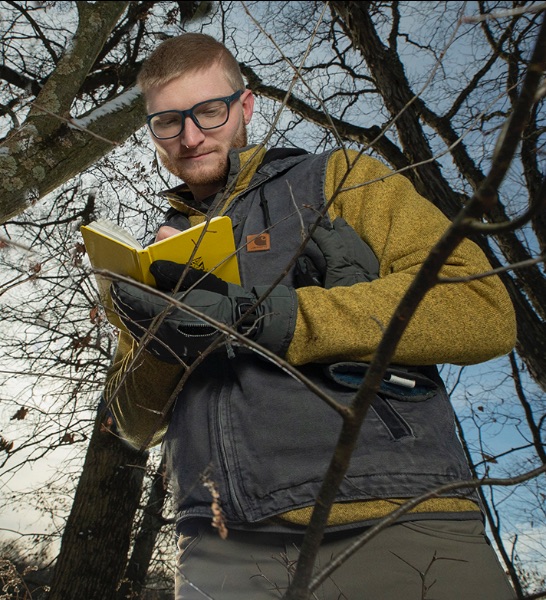Mason Heberling of Carnegie Museum of Natural History and Caitlin McDonough MacKenzie at University of Maine awarded for climate change research
George Mercer Award recognizes outstanding, recently published, ecological research by young scientists

[Pittsburgh, Pennsylvania, April 16, 2020] — The Ecological Society of America (ESA) named co-authors Mason Heberling, Assistant Curator of Botany at Carnegie Museum of Natural History, and Caitlin McDonough MacKenzie, postdoctoral fellow at University of Maine, recipients of the George Mercer Award that recognizes excellence in recent ecological research by scientists aged 40 years or younger at time of publication. Heberling and McDonough MacKenzie, who share the award with the more senior co-authors Richard Primack of Boston University, Susan Kalisz of the University of Tennessee, Knoxville, and Jason Fridley of Syracuse University, compared historical observations collected by Henry David Thoreau with new observations to show effects of climate change on spring wildflowers and trees. The study, entitled “Phenological mismatch with trees reduces wildflower carbon budgets,” appeared in the scientific journal Ecology Letters in February 2019. The study demonstrated that trees are responding more rapidly to climate change than wildflowers, and this is having a negative effect on wildflower energy budgets.
ESA describes the research as “creative and powerful integration of historical records and contemporary experiments covering many species.” ESA goes on to note that Heberling and his colleagues “tell a convincing and important scientific story with notably clear writing and compelling visuals.”
“It is an immense honor to share this prestigious award with Caitlin and co-authors,” said Heberling. “We didn’t even know each other when we were collecting our separate datasets, but with serendipity and word-of-mouth, our projects came together to reveal findings that were exciting, surprising, and alarming at the same time. I am humbled to receive this award that celebrates a rich legacy of previous winners who have greatly influenced and inspired the field of ecology. I still can’t quite believe it.”
The research team compared Thoreau’s observations in Concord, Massachusetts to photosynthetic data collected by Heberling in a forest in Fox Chapel, Pennsylvania, near Pittsburgh, as part of a multi-year field experiment. Heberling adapted these measurements to calculate how temperature-driven shifts in trees leafing out has impacted wildflowers from Thoreau’s time until now.
The combined analysis shows that small differences in the responses of wildflowers versus trees to a warming climate could be harming wildflower abundance and growth already, with greater effects in coming years. The innovative study shows how phenological mismatches between trees and wildflowers can impact plant physiology and energy budgets and suggests future experiments and observations that can be carried out.
“The research of Mason and his colleagues presents an innovative approach to understanding the shifts in plant response, and therefore changes in the plant community, with changing climate,” said Rose-Marie Muzika, Director of Science and Research at Carnegie Museum of Natural History. “It exemplifies the creative scientific direction of Carnegie Museum of Natural History by reaching into the past and studying the present to provide a potential glimpse into the future.”
The Ecological Society of America (ESA) is a nonpartisan, nonprofit organization of scientists founded in 1915 to promote ecological science by improving communication among ecologists; raise the public’s level of awareness of the importance of ecological science; increase the resources available for the conduct of ecological science; and ensure the appropriate use of ecological science in environmental decision making by enhancing communication between the ecological community and policy-makers.
